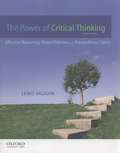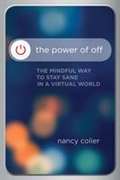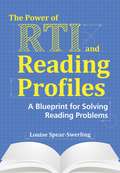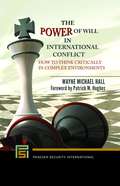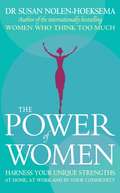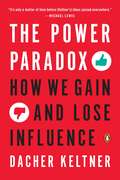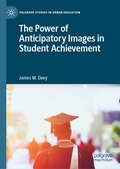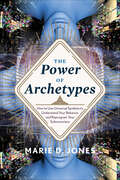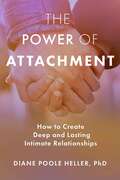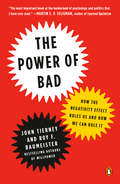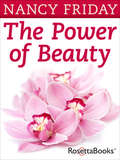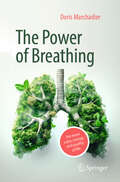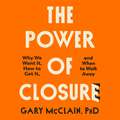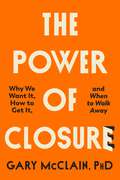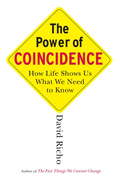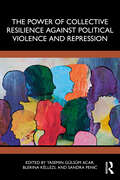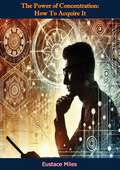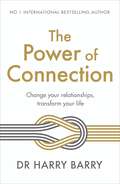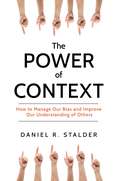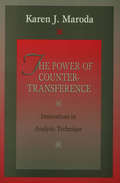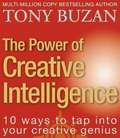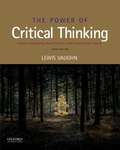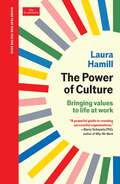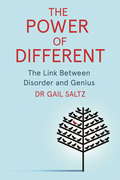- Table View
- List View
The Power Of Critical Thinking: Effective Reasoning About Ordinary And Extraordinary Claims
by Lewis VaughnThis comprehensive and engaging introduction to critical analysis delivers clear, step-by-step guidelines that provide students with the tools they need to systematically and rationally evaluate arguments, claims, and evidence. Fully up-to-date with examples from contemporary culture, politics, and media, this text helps students develop the skills they need to engage meaningfully with the world around them.
The Power Of Empathy: A Practical Guide To Creating Intimacy, Self-understanding And Lasting Love
by Katherine Ketcham Arthur P. CiaramicoliArguing that empathy is the driving force behind love, the author shows readers how to bring this all-important trait to the fore in relationships.
The Power Of Off: The Mindful Way To Stay Sane In A Virtual World
by Nancy ColierOur reliance on technology is rapidly changing how each of us experiences life. We’re facing new issues and difficulties, we’re encountering new emotional triggers, and we’re relating to each other in new ways. As Dr. Nancy Colier writes, "How we spend our time, what motivates us, and what we want are all are on a radical course of transformation." The promise of technology is that it will make our lives easier; yet to realize that promise, we cannot be passive users—we must bring awareness and mindfulness to our relationships with our devices. "The compulsion to constantly check our devices plays on primal instincts," teaches Colier. "Even people with strong spiritual practices or those who have never had other addiction issues now find themselves caught in the subtle trap of these miraculous tools we’ve created." Through The Power of Off, she offers us a path for making use of the virtual world while still feeling good, having healthy relationships, and staying connected with what is genuinely meaningful in life. You’ll explore: How and why today’s devices push our buttons so effectively, and what you can do to take back control of your life • Tips for navigating the increasingly complex ways in which technology is affecting our relationships—with ourselves, others, and our devices themselves • Self-evaluation tools for bringing greater awareness to your use of technology • Mindfulness practices for helping you interact with your devices in more conscious ways • A 30-day digital detox program to kick-start a new healthier relationship with technology With The Power of Off, Colier sounds the call for wakefulness, reminding us that we can use technology in a way that promotes, rather than detracts from, our well-being. This book provides an essential resource for anyone wanting to create a more empowered relationship with technology in the digital age.
The Power Of RTI And Reading Profiles: A Blueprint For Solving Reading Problems
by Louise Spear-SwerlingThis one-of-a-kind text explains why RTI is today's best approach for preventing reading difficulties—and how research on reading profiles can enhance the power of RTI. For practitioners, the book provides a complete, evidence-based blueprint for using RTI and reading profiles in tandem to plan effective core literacy instruction and help struggling readers in Grades K-6, whether they have disabilities or issues related to experience (e.g., ELLs, children from poverty backgrounds). For researchers and policymakers, the book describes ways to help ensure higher reading achievement for every student, including improvements in core reading instruction, use of RTI practices and the Common Core State Standards, and teacher preparation.
The Power Of Will In International Conflict: How To Think Critically In Complex Environments (Praeger Security International)
by Wayne HallWill has been--and always will be--the basis for succeeding in any conflict or competition. To win in a conflict or competition, decision-makers must comprehend the meaning and implications of will and successfully transform theories about it into practice. In the 21st century, it is especially important for military leaders and security professionals to comprehend will in sufficient depth to enable them to impose their will on other resisting entities and learn how to block or parry their adversaries' efforts to impose their will on them. This book will go a long way in helping decision-makers achieve these goals. <p><p> Each chapter in this book addresses one of 14 elements that will help readers to use will successfully over their adversaries: life-force, purpose, strength of motive, capabilities, determination, perseverance, sacrifice, passion, advantage, disadvantage, imposition, action, assessment, and adaptation. The book also provides readers with 18 considerations that will serve them well in all types of conflicts. This book will be particularly beneficial to decision-makers in the military, law enforcement, and business, as well as attorneys and judges.
The Power Of Women: Harness your unique strengths at home, at work and in your community
by Susan Nolen-HoeksemaThis new book from bestselling author Susan Nolen-Hoeksema helps women to discover, develop and harness their distinct psychological and social strengths so they can build their confidence and achieve their full potential in all aspects of their lives. The author believes that women are generally extremely hard on themselves: they concentrate on their flaws and shortcomings, trying all the time to fix problems that no one else can see. Her 25 years' research reveals that women have exceptional skills and, despite being ignored or dismissed over the millenia, have shown that they can be superb leaders, entrepreneurs and innovators. Women do much more right than they do wrong. Using the latest thinking in cognitive and behavioural therapy, motivating case histories and easy-to-follow exercises, Susan Nolen-Hoeksema introduces a new programme for step-by-step change. She helps women to understand what is holding them back and inspires them to transform their lives, their work and their relationships.
The Power Paradox: How We Gain and Lose Influence
by Dacher KeltnerA revolutionary and timely reconsideration of everything we know about power. Celebrated UC Berkeley psychologist Dr. Dacher Keltner argues that compassion and selflessness enable us to have the most influence over others and the result is power as a force for good in the world.It is taken for granted that power corrupts. This is reinforced culturally by everything from Machiavelli to contemporary politics. But how do we get power? And how does it change our behavior? So often, in spite of our best intentions, we lose our hard-won power. Enduring power comes from empathy and giving. Above all, power is given to us by other people. This is what all-too-often we forget, and what Dr. Keltner sets straight. This is the crux of the power paradox: by fundamentally misunderstanding the behaviors that helped us to gain power in the first place we set ourselves up to fall from power. We can't retain power because we've never understood it correctly, until now. Power isn't the capacity to act in cruel and uncaring ways; it is the ability to do good for others, expressed in daily life, and itself a good a thing.Dr. Keltner lays out exactly--in twenty original "Power Principles"-- how to retain power, why power can be a demonstrably good thing, and the terrible consequences of letting those around us languish in powerlessness.
The Power of Anticipatory Images in Student Achievement (Palgrave Studies in Urban Education)
by James M. DavyThis book features ten high academically achieving, low-income, inner city students from Newark, New Jersey, who graduated from public high schools at or near the top of their class and continued to excel in college. Using a qualitative research design, the author interviewed the ten students and the person who most influenced their educational progress about what motivated them to achieve at such high levels. Three mutually reinforcing anticipatory images emerged as a common element of their stories. In their own voices, the students describe the anticipatory images they framed, how they developed them, and how they used them to their advantage. Davy advances a theoretical model of the Anticipatory Competent student who continually progresses in the directions of the images projected ahead.
The Power of Archetypes: How to Use Universal Symbols to Understand Your Behavior and Reprogram Your Subconscious
by Marie D. JonesA self-help guide to understanding the language of archetypal symbols and harnessing them for personal success.Deep within your mind is a realm filled with powerful symbols that drive your thoughts, behaviors, and actions—often without your knowledge. This is the hidden world of “archetypes”: universal symbols responsible for who you are, how the world sees you, and what you believe about yourself and your life’s purpose.The Power of Archetypes will help you identify, understand, and work with the archetypes that exist beyond your conscious awareness to create your reality “behind the scenes.” You will also learn how to clear out old symbols that may be blocking you from the happiness and success you dream of. You will examine:• The roles of the subconscious and collective unconscious in shaping your identity, and why it is so hard to change “you”• The most common archetypes and what they symbolize• Global archetypes in religion, politics, and pop culture, and how they affect you• Ways to identify archetypes working in your life and the skills to change them and become more authentic.Archetypes reveal your plot and your purpose. The good news is, if you don’t like them, you can choose more empowering symbols to create a completely new story of your life.
The Power of Attachment: How To Create Deep and Lasting Intimate Relationships
by Peter Levine Diane Poole HellerHow traumatic events can break our vital connections―and how to restore love, wholeness, and resiliency in your life. <p><p> From our earliest years, we develop an attachment style that follows us through life, replaying in our daily emotional landscape, our relationships, and how we feel about ourselves. And in the wake of a traumatic event―such as a car accident, severe illness, loss of a loved one, or experience of abuse―that attachment style can deeply influence what happens next. <p><p> In The Power of Attachment, Dr. Diane Poole Heller, a pioneer in attachment theory and trauma resolution, shows how overwhelming experiences can disrupt our most important connections― with the parts of ourselves within, with the physical world around us, and with others. <p><p> The good news is that we can restore and reconnect at all levels, regardless of our past. <p><p> Here, you’ll learn key insights and practices to help you: <p>• Restore the broken connections caused by trauma <p>• Get embodied and grounded in your body <p>• Integrate the parts of yourself that feel wounded and fragmented <p>• Emerge from grief, fear, and powerlessness to regain strength, joy, and resiliency <p>• Reclaim access to your inner resources and spiritual nature <p><p> "We are fundamentally designed to heal," teaches Dr. Heller. "Even if our childhood is less than ideal, our secure attachment system is biologically programmed in us, and our job is to simply find out what’s interfering with it―and learn what we can do to make those secure tendencies more dominant." <p><p> With expertise drawn from Dr. Heller’s research, clinical work, and training programs, this book invites you to begin that journey back to wholeness.
The Power of Bad: How the Negativity Effect Rules Us and How We Can Rule It
by Roy F. Baumeister John Tierney"The most important book at the borderland of psychology and politics that I have ever read."—Martin E. P. Seligman, Zellerbach Family Professor of Psychology at that University of Pennsylvania and author of Learned Optimism Why are we devastated by a word of criticism even when it&’s mixed with lavish praise? Because our brains are wired to focus on the bad. This negativity effect explains things great and small: why countries blunder into disastrous wars, why couples divorce, why people flub job interviews, how schools fail students, why football coaches stupidly punt on fourth down. All day long, the power of bad governs people&’s moods, drives marketing campaigns, and dominates news and politics. Eminent social scientist Roy F. Baumeister stumbled unexpectedly upon this fundamental aspect of human nature. To find out why financial losses mattered more to people than financial gains, Baumeister looked for situations in which good events made a bigger impact than bad ones. But his team couldn&’t find any. Their research showed that bad is relentlessly stronger than good, and their paper has become one of the most-cited in the scientific literature. Our brain&’s negativity bias makes evolutionary sense because it kept our ancestors alert to fatal dangers, but it distorts our perspective in today&’s media environment. The steady barrage of bad news and crisismongering makes us feel helpless and leaves us needlessly fearful and angry. We ignore our many blessings, preferring to heed—and vote for—the voices telling us the world is going to hell. But once we recognize our negativity bias, the rational brain can overcome the power of bad when it&’s harmful and employ that power when it&’s beneficial. In fact, bad breaks and bad feelings create the most powerful incentives to become smarter and stronger. Properly understood, bad can be put to perfectly good use. As noted science journalist John Tierney and Baumeister show in this wide-ranging book, we can adopt proven strategies to avoid the pitfalls that doom relationships, careers, businesses, and nations. Instead of despairing at what&’s wrong in your life and in the world, you can see how much is going right—and how to make it still better.
The Power of Beauty: Our Looks, Our Lives
by Nancy FridayReflections on how physical appearance, and beliefs about it, affect women&’s lives from a #1 bestselling author who&’s &“enormously fun to read&” (The New York Times). Beauty and appearance play a pervasive role in our culture. Here, the #1 New York Times-bestselling author of the groundbreaking, controversial bestseller My Secret Garden delves into beauty's influence on popular media and the psyche of modern women. Combining in-depth cultural analysis with personal anecdotes, sexology, and individual case studies, Nancy Friday explores the dissatisfaction women feel about their bodies—and how it affects their sexual freedom. Her analysis is broad-reaching, examining how popular culture, advertising, stereotypes of women in the workplace, the sexual liberation of the 1960s, and the dynamics of family relationships put pressure on women to live up to an impossible feminine ideal. Also published under the title Our Looks, Our Lives
The Power of Breathing: For More Calm, Energy, and Quality of Life
by Doris MarchadierHave you ever experienced the calming effect of a deep breath? With this guide, you will learn how intuitive breathing can improve your quality of life. Targeted breathing techniques help you navigate your daily life with more calmness. Whether you suffer from chronic respiratory diseases like asthma and COPD, want to reduce pain, or strengthen your mental well-being and immune system – this guide offers practical exercises to help you consciously use your breath, bringing more peace, energy, and balance into your life.From the contents: The universal power of breathing and its history, the anatomy and functioning of the respiratory system, targeted breathing techniques for stress, inner tension, and healthy sleep, and the connection between breathing and meditation
The Power of Closure: Why We Want It, How to Get It and When to Walk Away
by Gary McClain"If only I could get some closure..." If you've found yourself saying these words, you're not alone. When you've lost a relationship, a job, or a loved one, closure can seem as elusive as it is necessary. Psychotherapist and relationship coach Gary McClain says it's one of the most common - and important - issues his clients bring up.In this empathetic and insightful guide, Dr McClain explains why the promise of closure is so appealing - and why it's not always all it's cracked up to be. He walks readers through what closure is (and isn't), the reasons we want it, how to seek it in healthy and productive ways, and ways to move forward when we don't get the closure we're looking for. Learn how to find peace and leave regret behind when you can't stop obsessing about a fight with a friend, when your world has been turned upside down by a breakup, or when a loved one has died. Whether you're dealing with the pain of loss or are simply feeling the need to tie up a loose end, big or small, in a relationship, the power of closure will help you let go of the past and embrace the future.
The Power of Closure: Why We Want It, How to Get It and When to Walk Away
by Gary McClain"If only I could get some closure..." If you've found yourself saying these words, you're not alone. When you've lost a relationship, a job, or a loved one, closure can seem as elusive as it is necessary. Psychotherapist and relationship coach Gary McClain says it's one of the most common - and important - issues his clients bring up.In this empathetic and insightful guide, Dr McClain explains why the promise of closure is so appealing - and why it's not always all it's cracked up to be. He walks readers through what closure is (and isn't), the reasons we want it, how to seek it in healthy and productive ways, and ways to move forward when we don't get the closure we're looking for. Learn how to find peace and leave regret behind when you can't stop obsessing about a fight with a friend, when your world has been turned upside down by a breakup, or when a loved one has died. Whether you're dealing with the pain of loss or are simply feeling the need to tie up a loose end, big or small, in a relationship, the power of closure will help you let go of the past and embrace the future.
The Power of Coincidence: How Life Shows Us What We Need to Know
by David RichoMeaningful coincidences and surprising connections occur all the time in our daily lives, yet we often fail to appreciate how they can guide us, warn us, and confirm us on our life's path. This book explores how meaningful coincidence operates in our daily lives, in our intimate relationships, and in our creative endeavors. The Power of Coincidence will help you to: interpret a series of similar happenings, open yourself to assisting forces around you, understand how your dreams can guide you through life events, use your creative imagination in life choices--and live in accord with your deepest needs and wishes, as revealed to you by meaningful coincidences. Originally published under the title Unexpected Miracles, the author has fully revised and updated the book for this edition.
The Power of Collective Resilience Against Political Violence and Repression
byThis book outlines the importance of collective resilience for civilians in the face of war and political violence, examining how people develop social resources to confront adversity and foster meaningful change.Drawing on novel research from a range of diverse contexts, the book explores a nuanced picture of how political violence can lead to increased social cooperation and action within communities, as well as the well-documented negative dynamics. It brings together research into the collective resilience of civilians in the context of political violence and repression in three fields: psychological well-being, resistance and collective action, and reconciliation and peacebuilding. Chapters describe the underlying social-psychological processes behind collective resilience and discuss the limits and boundary conditions in the emergence of resilience. The contributors illustrate how communities leverage solidarity and shared identity to challenge divisive violence, pursue justive, and build sustainable peace, empasizing the importance of social processes in transforming harm into pathways for recovery, empowerment, and resilience.The Power of Collective Resilience Against Political Violence and Repression will be highly relevant reading for postgraduate students and academics in the fields of social and political psychology, and those researching intergroup relations, social change, peace, and conflict. It will also be of interest to activists interested in collective action and resilience.
The Power of Concentration: How To Acquire It
by Eustace Miles"The Power of Concentration: How To Acquire It" by Eustace Miles is a timeless guide that unlocks the secrets to developing and harnessing the incredible power of focused thought. In an era where distractions are abundant, Miles' insights remain as relevant and transformative as ever, offering readers practical strategies to enhance their mental discipline and achieve their goals.Drawing on his extensive experience as a renowned educator and athlete, Eustace Miles presents a compelling case for the vital role concentration plays in personal and professional success. Through clear, concise language, he outlines step-by-step methods for cultivating this essential skill, making the process accessible to readers of all backgrounds and levels of experience.Miles begins by explaining the fundamental principles of concentration, emphasizing the importance of a focused mind in overcoming challenges and achieving peak performance. He then delves into specific techniques designed to strengthen one's ability to concentrate, including mental exercises, visualization practices, and disciplined habits that promote sustained attention.Throughout the book, Miles provides practical examples and relatable anecdotes that illustrate the benefits of enhanced concentration in various aspects of life. Whether it's improving academic performance, excelling in sports, or advancing in one's career, the lessons contained in "The Power of Concentration" are universally applicable and deeply impactful."The Power of Concentration: How To Acquire It" also addresses common obstacles to concentration, such as procrastination, stress, and mental fatigue. Miles offers effective solutions for overcoming these barriers, enabling readers to maintain a clear and focused mind even in the face of adversity.Eustace Miles' classic work is an invaluable resource for anyone seeking to unlock their full potential through the power of concentrated thought. With its practical advice and timeless wisdom, this book remains a cornerstone for those committed to personal growth and achieving excellence in all areas of life.
The Power of Connection: Change your relationships, transform your life
by Dr Harry BarryIn this expert-led guide, Dr Harry Barry draws on his decades of experience as a doctor to show readers how we can improve our emotional connections and transform our mental wellbeing.The Power of Connection will empower you with the fascinating science behind our existing behaviours and all the need-to-know tips and techniques for improving our skills of emotional connection. From the neuroscience behind communication to the role of verbal language, the importance of setting to the power of humour, this book gives you all the tools you need to thrive in any networking or social situation. This book will help you to:· Feel less lonely· Experience deeper friendships and personal relationships· Be someone who makes others feel comfortable· Be more effective in the workplace· Experience all the positive effects of these changes on your mental and physical healthIncluding case studies and practical exercises, The Power of Connection offers a step-by-step roadmap to improved social confidence, better workplace communication and more fulfilling emotional connections, with ourselves and others.
The Power of Context: How to Manage Our Bias and Improve Our Understanding of Others
by Daniel R. StalderA social psychologist focuses on a very common yet rarely discussed bias called the "fundamental attribution error," showing how being aware of this bias can improve our day-to-day understanding of others.Social life involves making judgments about other people. Often these snap judgments turn out to be wrong when we overlook context. Social psychologists call this pervasive bias the "fundamental attribution error." This book explores the many ways in which this error creeps into our social interactions, frequently causing misunderstanding, hurt feelings, and negative treatment of others.Psychologist Daniel R. Stalder examines common examples of this error, from road rage and misinterpreting facial expressions to "gaydar," victim blaming, and prejudice. The common denominator in these diverse examples is that we falsely assume inherent traits or intentions while overlooking situational factors that might explain a person's behavior. Conversely in the actor-observer bias, we explain our own sometimes questionable behaviors by appealing to situational factors. For example, when you tailgate others, there's always a good reason, but when others tailgate you, they are obviously in the wrong.Stalder also reveals little-known information about classic studies of context, considers both the upsides and downsides to bias, and shares numerous strategies to reduce bias. Filled with interesting examples, new insights, and an abundance of research, this informative and entertaining book will help us understand each other and reduce conflict.
The Power of Countertransference: Innovations in Analytic Technique
by Karen J. MarodaA signpost of the relational turn in contemporary psychoanalysis, Karen Maroda's The Power of Countertransference, published in 1991, is perhaps the first systematic effort to integrate the need for mutual emotional exchanges, which may include the analyst's own self-disclosures, into an interactive model of psychoanalytic practice. Maroda's call for emotional honesty and affective self-disclosure had an immediate impact on the field and led Harold Searles to comment, "If we follow the example set by Maroda, we shall be minimally likely to 'act in' our emotions in our sessions with our patients. They will benefit greatly as a result; we practitioners shall benefit; and the profession of psychoanalysis and psychoanalytic therapy will become healthier and stronger than it is at present." This revised edition includes a new Foreword by Lewis Aron and an Afterword in which Maroda clarifies her own position and comments on the evolution of psychoanalytic technique since the publication of The Power of Countertransference.
The Power of Creative Intelligence
by Tony BuzanPresents techniques to help the reader be creative, develop the ability to see things from different angles, and think of new ideas.
The Power of Critical Thinking: Effective Reasoning about Ordinary and Extraordinary Claims
by Lewis VaughnThis book provides the broadest range of tools to show students how critical thinking applies in their lives and the world around them. It explores the essentials of critical reasoning, argumentation, logic, and argumentative essay writing while also incorporating important topics that most other texts leave out, such as "inference to the best explanation," scientific reasoning, evidence and authority, visual reasoning, and obstacles to critical thinking.
The Power of Culture: An Economist Edge Book (The Economist Edge Series)
by Laura HamillA revelatory new book showing how organizations need to be proactive about their culture—and how they can achieve that vital goal.All organizations have a culture, whether they acknowledge it or not—and whether it's helping or hindering them. Get it right, and culture can be a positive force for good. Get it wrong, and culture can be a negative force, becoming toxic and undermining performance and reputations. In short, culture matters. Organizational culture, though, can be a tricky thing to understand and master. The Power of Culture tackles this head-on, exploring what culture is, and why it matters; how it needs to be aligned with strategy and values; and how to understand it, change it, and make it a reality. Told through real stories and examples and using the author's Intentional Culture Circle as a guide, this new book helps everyone at work to be more aware of culture and how to find opportunities to use it for growth and success.
The Power of Different: The Link Between Disorder and Genius
by Dr. Gail SaltzThe Power of Different is an illuminating and uplifting examination of the link between brain differences and aptitude. Psychologist and bestselling author Gail Saltz presents the latest scientific research and profiles famous geniuses and lay individuals who have been diagnosed with all manner of brain 'problems' - including learning disabilities, ADD, anxiety, depression, bipolar disorder, schizophrenia and autism. Saltz shows that the source of our struggles can be the origin of our greatest strengths. Rooted in her experience as a professor and practicing psychiatrist, and based on the latest neurological research, Saltz demonstrates how specific deficits in certain areas of the brain are directly associated with the potential for great talent. She also shows how the very conditions that can cause difficulty at school, in social situations, at home or at work, are bound to creative, disciplinary, artistic, empathetic and cognitive abilities.In this pioneering work, readers will find engaging scientific research and stories from historical geniuses and everyday individuals who have not only made the most of their conditions, but who have flourished because of them. Enlightening and inspiring, The Power of Different shows how the unique wiring of every brain can be a source of strength and productivity, and can contribute to the richness of our world.
